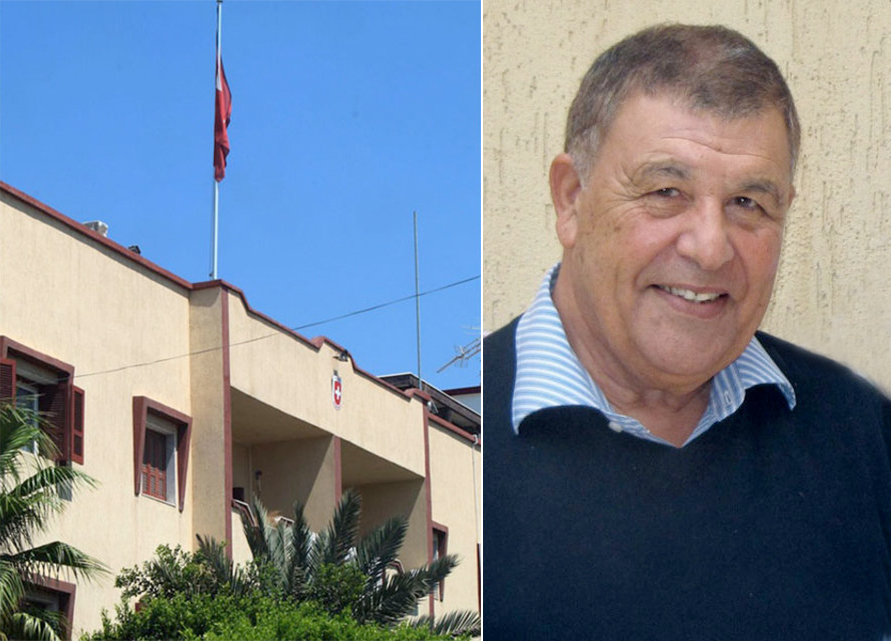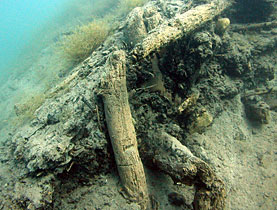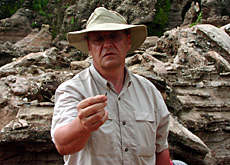Rock art project shows other side of Libya

A Swiss artist has discovered that there is more to Libya than Moammar Gaddafi or the ongoing diplomatic crisis over a Swiss businessman held in the North African state.
Jörg Mollet got to know a country full of cultural treasures and an open-minded population eager to meet visitors. He also became enthralled by the rock surface etchings and cave paintings in Libya’s southwestern Messak desert.
He went to great lengths to take pictures of prehistoric elephants, rhinoceroses, giraffes, men wearing masks and women hunters riding African buffalos. These rock paintings from the Stone Age belong to the Unesco world heritage of the Sahara desert.
Mollet not only battled with the Libyan bureaucracy to reach the works of art, dating to 10,000 BC, he also had to get past numerous police checkpoints in the desert, brave sandstorms and temperatures above 40 degrees Celsius.
He occasionally climbed over barbed wire to take a closer look at the etchings – something only the Libyan leader could have given him permission to do.
Mollet led three expeditions in the desert for his Swiss-Libyan Art Project between 2005 and 2008. The idea was to link the prehistoric rock paintings to the works of art of contemporary Libyan artists and to anonymous graffiti in the capital Tripoli.
The project, launched together with Swiss author Aurel Schmidt, was also aimed at promoting a cultural exchange between Libya and Switzerland.
From Stone Age to graffiti
Putting prehistoric rock engravings and the graffiti on Tripoli’s buildings of today side by side makes one aware that certain symbols, for instance the heart, have kept their significance.
The cave etchings have lost nothing of their immediacy in Mollet’s photographs. The way he highlights and outlines the engravings reminds one of work by Pablo Picasso or Keith Haring.
The art project is supported by both the Libyan and the Swiss-based Unesco commissions.
“Libya is the cradle of mankind, the beginning of civilisation,” Mollet said. All the more reason for the Swiss to help preserve the evidence from the Stone Age.
This is why Libyans are very proud of their country and a culture whose roots go back to 12,000 BC and which 5,000 years later moved to the Nile Valley following a renewed period of drought.
Open minds
Mollet says he is always impressed by the open-mindedness of the Libyans. He met people who spoke English, Italian, French and German during his visits.
It is not unusual to find somebody who can explain the menu in a restaurant in perfect German. Or, as a German-speaking Swiss, you might be asked to justify your rather mediocre knowledge of French.
Such incidents made him ashamed of the Eurocentric attitude of many Swiss and their complete lack of knowledge about Libya, while Libyans – many of whom studied or worked abroad – know a lot about western culture and history.
“Many Swiss still live in a spirit of isolation from the Second World War. We’re not ready for globalisation and even relations with other western societies seem difficult,” he said.
Parallel realities
The strict regime of Gaddafi led to the emergence of a sort of “parallel society”, he added. Universities have become “closed-off realities” where people can live their own lives and follow their own interests in a relatively sheltered environment.
Life in Libya is full of surprises, he said. He has met a general who has an impressive collection of modern African art and a woman wearing a headscarf but with a healthy self-confidence.
Libyans have also found ways to discuss religion, politics and sex – taboo subjects in society.
“People often begin to talk about a broad range of issues when you take a taxi or when you are in the desert,” Mollet said.
Real life is in a sort of grey zone and discretion is the key. “You are lost if you get tangled up in the arbitrariness of the government system.”
Corinne Buchser, swissinfo.ch (adapted from German by Urs Geiser)
The rock art project was launched by Jörg Mollet and Aurel Schmidt.
Among the Libyan artists taking part is 33-year-old Khadija Elferjani. She combines elements of her art, women’s concerns and African motives.
Ali Ezouik, a 61-year-old painter, put his watercolours on display in a Geneva gallery and at an art exhibition in Zurich in 2008.
Awad Elkish trained as a cameraman in Germany and later worked in Austria. He is teaching at the al-Fatah University.
However, a plan for a documentary by the Swiss filmmaker Bruno Moll has been put on hold after the diplomatic crisis between Switzerland and Libya began in 2008.
July 2008: Hannibal Gaddafi and his wife are charged with abusing their staff. The staff are later compensated and charges dropped. Swiss nationals Max Göldi and Rachid Hamdani are arrested. Swiss businesses are forced to shut and flights to Tripoli are cut.
June 2009: Libya withdraws assets from Swiss banks.
August: The Swiss president apologises for Hannibal’s arrest.
September: Göldi and Hamdani disappear after a medical check-up in Tripoli.
October: A deadline for normalising Swiss-Libya relations passes.
November: Swiss ministers say they will pursue visa restrictions for Libyans. Göldi and Hamdani are sentenced to 16 months in prison for visa violations.
January 2010: Hamdani’s term is overturned and Göldi’s is cut.
February: After reports of a Swiss visa blacklist of 188 top Libyans, Libya stops issuing visas to citizens from the Schengen zone. European foreign ministers try to hammer out a solution. Göldi starts prison term. Hamdani is allowed to leave Libya.

In compliance with the JTI standards
More: SWI swissinfo.ch certified by the Journalism Trust Initiative















You can find an overview of ongoing debates with our journalists here . Please join us!
If you want to start a conversation about a topic raised in this article or want to report factual errors, email us at english@swissinfo.ch.